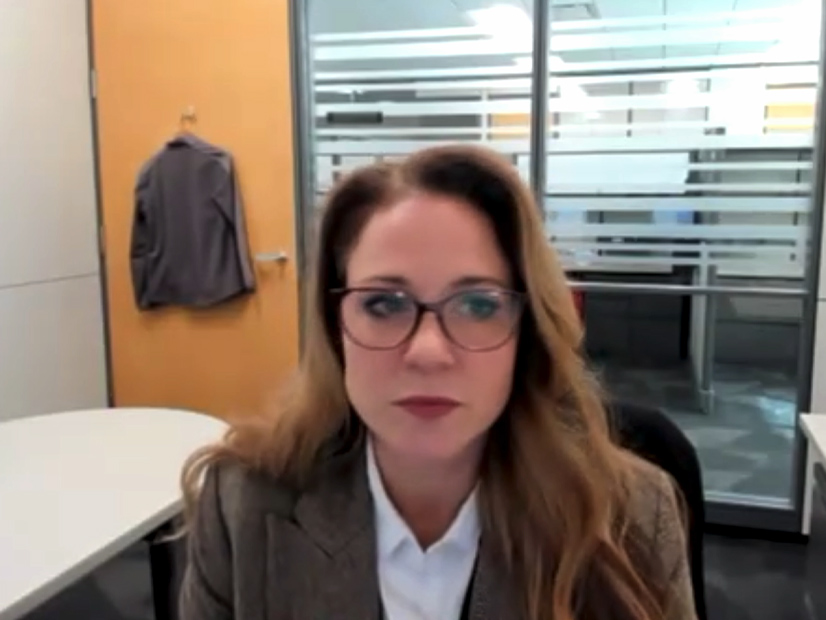NERC’s Standards Committee can expect a packed year of reliability standards development in 2024, Vice President of Engineering and Standards Soo Jin Kim said at the committee’s monthly meeting Nov. 15.
Updating members on NERC’s Reliability Standards Development Plan (RSDP), Kim said there are 11 standards development projects the ERO considers high-priority — meaning they must be adopted by NERC’s Board of Trustees by the end of 2024. These include the following projects, some of which are targeting earlier approval dates:
-
- 2021-07 (Extreme cold weather grid operations, preparedness and coordination) — to be approved by February
- 2016-02 (Modifications to CIP standards) — February
- 2023-03 (Internal Network Security Monitoring) — May
- 2023-02 (Performance of inverter-based resources) — October
- 2023-07 (Transmission system planning performance requirements for extreme weather) — December
- 2020-02 (Modifications to PRC-024 (Generator ride-through)) — December
- 2021-04 (Modifications to PRC-002 (Data sharing)) — December
- 2021-03 (Modifications to CIP-002) — December
- 2023-04 (Modifications to CIP-003) — December
- 2023-06 (Physical security) — December
- 2022-03 (Energy assurance with energy-constrained resources) — December
An additional 14 medium- and low-priority projects are targeting board adoption in 2025 and beyond, Kim said, and will not be posted for formal comment or ballot periods in the first half of 2024 in order to allow industry stakeholders who are part of the ballot body to focus on the most pressing projects. Kim clarified that these projects will still move forward during this time and be allowed to hold informal postings to solicit industry feedback on their progress.
NERC also considers FERC’s order last month that the ERO develop standards on the reliability of inverter-based resources (IBR) a high priority, Kim said, adding that the commission’s mandate “threw us for a loop” because it meant revising the draft RSDP to account for it. (See FERC Orders Reliability Rules for Inverter-Based Resources.) While no standard authorization requests (SAR) have been created yet for the order, NERC’s Engineering department is working with other groups in the organization to create a plan for tackling FERC’s directive.
Standards Actions Approved
Later in the meeting, the committee voted to move forward with two standards projects.
First, members agreed to post proposed revisions to NERC’s glossary for the terms “IBR” and “IBR unit” for a 45-day formal comment period. The changes were suggested by the standards development team for Project 2020-06 (Verifications of models and data for generators) after it received stakeholder requests to provide clearer definitions for terms used in its proposed standards.
The changes would define an IBR unit as a device or group of devices that use a power electronic interface such as an inverter or converter, capable of exporting real power from a primary energy source or energy storage system. An IBR would be defined as a source of electric power connected to the transmission, sub-transmission or distribution system and that consists of one or more IBR units operated as a single resource at a common point of interconnection.
Both definitions finished an informal comment period last month. The formal comment period, as approved by the committee, will begin Nov. 16 and conclude Jan. 4, 2024.
Committee members also accepted a SAR proposed by the SDT for Project 2023-07, meant to address FERC’s June order directing NERC to update its rules to require responsible entities to plan for extreme heat and cold weather events (RM22-10). (See FERC Approves More Extreme Weather Rules.) The new SAR will allow the Project 2023-07 team to decide whether to draft a new standard or revise TPL-001-5.1 (Transmission system planning performance requirements).
The committee deferred action on accepting another SAR intended to address risks posed by extreme weather, electric-natural gas interdependencies and disturbances impacting distributed energy resources. Members agreed to delay a vote on the SAR until the committee’s December meeting, to be held at NERC headquarters in Atlanta, after several attendees noted that the proposed SAR would also assign this effort to the 2023-07 team and expressed concern about the possibility of overloading the project.




